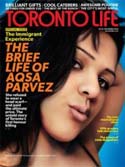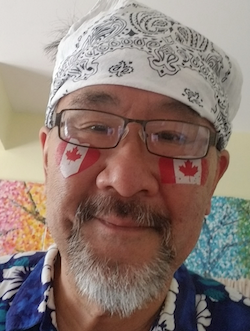 |
|
The controversial cover.
|
Toronto Life’s cover story on the murder of 16-year-old Aqsa Parvez is “Islamophobic,” “racist,” “sensationalistic” and “ignores the greater issue of violence against women,” according to panellists who spoke today at a press conference hosted by several women’s rights and anti-racism groups. The feature “puts a whole religious community on trial,” said Michelle Cho of the Urban Alliance on race relations. “When [B.C. pig farmer] Robert Pickton was convicted [for the murder of six women], the media didn’t look at his whiteness. The whole farming community wasn’t implicated.”
Mary Rogan’s story, titled "Girl, Interrupted," examines the death of a 16-year-old Muslim girl who, according to friends quoted in the story, was rebelling against her family’s values by not wearing a hijab, dressing in Western clothing and staying out late with friends. Just before her murder, Parvez had left home and was living with friends. On December 10, her brother, Waqas, offered to take her home to “get a fresh change of clothes.” “Less than an hour later, [Aqsa’s father] Muhammad Parvez phoned 911 and told the dispatcher that he had killed his daughter,” Rogan writes. Waqas and Muhammad will be tried for Aqsa’s murder sometime next year.
Generally, the objections raised at today's press conference centred on the article's focus on Aqsa and her family's Muslim heritage and the broader questions raised about multiculturalism's role in Canadian society. Instead, the panellists argued, the story should have looked at the broader issue of violence against women. "Misogyny is not just Muslim," said Nuzhat Jafr of the Canadian Council of Muslim Women, adding, "This story does nothing to stop the violence while instrigating fear and loathing against all Muslims."
Here are some of the specific criticisms of the piece dished out by the speakers at today’s press conference:
- The dek: “Aqsa Parvez had a choice: wear a hijab to please her devout family or take it off and be like her friends. She paid for her decision with her life.” One panellist argued there is no hard evidence to prove the hijab was the motive for the killing.
- The conflation of Aqsa’s death with earlier media stories about the “the acceptability of sharia law, disputes over young girls wearing hijabs at soccer games, and the arrest of the Toronto 18."
- The use of the term “honour killing,” defined in the piece as “murders deemed excusable to protect a family’s reputation.” Rogan uses a statistic, “an estimated 5,000 women die every year in honour killings,” and goes on to say that “many of them [happen] in Pakistan, where the Parvez family had emigrated from.”
- The posing of the question, “Is it possible that Toronto has become too tolerant of cultural differences?” Cho said the question itself was racist: “There’s a judgement implicit.”
- The implication that “ethnic enclaves” within the city create alienated and dangerous subcultures of immigrants who don’t share “Western liberal values.” Sumayya Kas of Our Collective Dreams, Muslim Women Against Violence objected to the way Rogan’s portrait of immigrant-heavy Mississauga (“you see stores offering halal meat, instant passport photos, Thai food and Pakistani takeout. Dental and legal clinics advertise in Perso-Arabic script”) was tied it to this specific incident of domestic violence.
- The use of photos taken from Aqsa’s Facebook page as art for the piece, which was deemed "distasteful" and "disrespectful."
- The motive for the story and its placement on the cover of the magazine. "Was it to sell magazines?" asked Nuzhat Jafr of the Canadian Council of Muslim Women. "To tell the story of the murder of an innocent young girl? Or to strike the flames of hatred?"
 |
|
| Jaded says: | |
Wow, Torstar really seems to be on a mission to bankrupt one magazine after another.... |
|
 |
|
| Lorene Shyba says: | |
Full of terrific information, Thanks!... |
|
- October 2025
- September 2025
- August 2025
- July 2025
- June 2025
- May 2025
- April 2025
- March 2025
- February 2025
- January 2025




